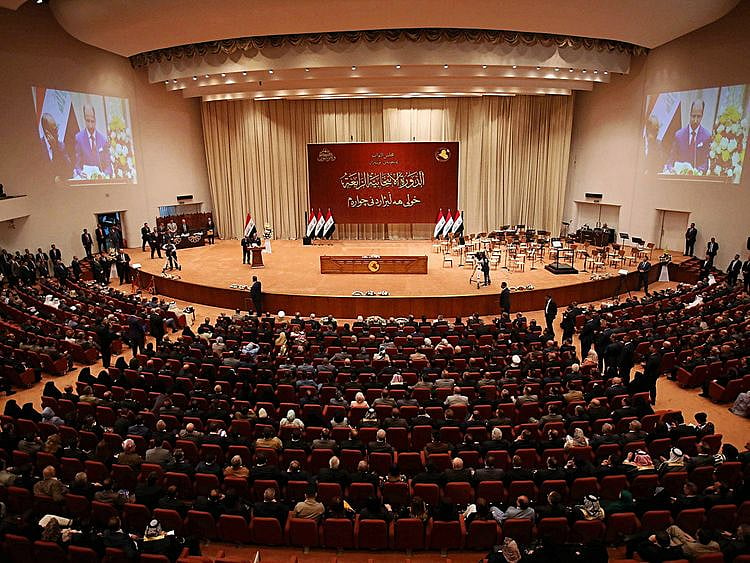Damascus: On January 9, Iraq’s newly-elected parliament will meet for the very first time, three months after nationwide elections took place in October. Its 329 MPs will have to name a new speaker, president, and prime minister.
According to norm, the eldest of the parliamentarians will chair the first session, and the assembly will get 30 days to elect a new president, replacing the incumbent Barham Salih.
Since the 2003 toppling of Saddam Hussein, the Iraqi presidency has traditionally been reserved for a Kurdish figure (with the brief exception of Ghazi Al Yawer in 2004-2005). Salih’s successor is up for the Kurdistan Democratic Party (KDP) and the Patriotic Union of Kurdistan (PUK) to decide, who jointly command 63 seats in the new Chamber.
The new president will then name a prime minister, replacing Mustafa Al Kadhimi. The new premier gets a constitutional period of 30 days to form a new government.
Opposition to Al Kadhimi
A former intelligence chief-turned politician, Al Kadhimi came to power in May 2020, originally with the support of Iran-backed political parties and their militias, like the Popular Mobilisation Units (PMU) and Kataib Hezbollah.
He quickly turned against his backers, however, promising to disarm the militias and confiscate their arms. He also promised accountability for the hundreds of Iraqi youth shot on the streets of Baghdad in October 2019, often by security services of thugs affiliated with the militias.
In June 2020, he ordered a raid on Kataib Hezbollah offices in a Baghdad suburb, arresting 14 militiamen and confiscating crates of missiles that he said were being used against US targets in Iraq.
The Iran-backed groups threatened to march on his office if he did not retract his orders, prompting the premier to order the release of their comrades.
Last May, he ordered the arrest of Qassam Musleh, another Iran-backed militia leader, who was accused, among other things, of assassinating Iraqi activists critical of Iran and staging attacks against the Ayn Al Asad military base, where US troops were stationed. Under pressure from the PMU, Al Kadhimi also released him.
On November 7, 2021, Al Kadhimi survived an assassination attempt when an explosive-laden drone struck his residence in the heavily-fortified Green Zone of Baghdad. He emerged unscathed but many believe this was the work of Kataib Hezbollah and the PMU, who were settling old scores with the Iraqi premier.
The Coordination Framework
Both parties are now vowing to bring him down, but they no longer have the parliamentary majority needed to single-handedly dictate government policy.
In the October 2021 elections, the Badr Organisation, an all-time favourite of Iran, lost 17 of its seats in parliament. Their bloc, once composed of 22 members, is now down to five, prompting its leader, Hadi Al Amiri, to claim that the elections were rigged, demanding a manual recount, which, to his dismay, showed the same results.
The same applies to the PMU of Faleh Fayyad, which only controls five seats as well. Together they are now calling themselves the Coordination Framework.
Among the names making the rounds as possible replacements to Al Kadhimi are former Prime Minister Haidar Abadi, a protégé of the PMU, and ex-Basra governor Asaad Al Eidani.
The Sadr factor
To maintain a say in who becomes premier, the PMU finds itself obligated to work with Shiite cleric Muqtada Al Sadr, who won more than a fifth of parliamentary seats in October, now controlling 73 seats of the Chamber.
Al Sadr played a crucial role in naming Al Kadhimi as premier in mid-2020, and might go for his re-appointment, given the premier’s excellent relations with the United States. But he also has to take fellow Shiite parliamentarians into consideration, who would never accept a second term for Al Kadhimi.
Al Sadr has been toying with the idea of naming a member of his Sairoun bloc as Iraq’s next premier. Earlier this year, one of his top aides, MP Hakim Al Zameli, put it bluntly: “If the premiership goes to any party other than the Sadrist movement, it means that the elections are rigged.”
Naming a premier requires a 165-majority in the Chamber of Deputies, however, which Al Sadr does not have. One option is for him to team up with the Taqqadum Party of Parliament Speaker Mohammad Halbousi (37 seats) and the State of Law Coalition of ex-premier, Nouri Al Malki (33 seats).
But even if these two blocs rally rank and file behind Al Sadr’s choice for premier, that would add up to 143 MPs, still 22 votes short of a majority.
“The Coordination Framework rejects the Sadrist plan at forming a majority government,” said Harry Istepanian, an independent economic analyst and senior Fellow at the Iraqi Energy Institute. They will demand a share of seats, which he says, will be accommodated at the expense of the State of Law Coalition.
The Kurdish Factor
Tipping the balance, and potentially breaking the impasse might be the two Kurdish parties, who will also have a say in who the new premier will be. The KDP holds 33 seats in the new chamber, while the PUK commands 17. If they team up with Al Sadr and the smaller blocs, then they might become the new kingmakers in Iraqi politics, with stronger representation in the executive branch.
“It will all come down to which Shiite bloc will make more concessions on longstanding disagreements between Erbil and Baghdad,” says Istepanian, highlighting dispute over the Iraqi Kurdistan’s 12.67% share of the Iraqi federal budget and dispute over Kurdistan oil.
Sign up for the Daily Briefing
Get the latest news and updates straight to your inbox
Network Links
GN StoreDownload our app
© Al Nisr Publishing LLC 2026. All rights reserved.
